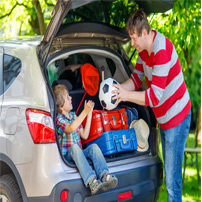Summertime Car Safety Tips for Parents
September 29, 2017 Throughout the summer season, children and teens are especially prone to sustaining certain types of injuries, such as overheating in cars and car accidents from teen driving. According to the American Automobile Association (AAA), rates of teen car crashes have gone up more than 10% in the last year alone. Over ½ of these accidents are the result of distracted driving – something that you can teach your teen about and help prevent from happening. When it comes to children being accidentally left in vehicles and becoming dangerously or deathly overheated, 29 children have died in hot cars as of July 31!
Throughout the summer season, children and teens are especially prone to sustaining certain types of injuries, such as overheating in cars and car accidents from teen driving. According to the American Automobile Association (AAA), rates of teen car crashes have gone up more than 10% in the last year alone. Over ½ of these accidents are the result of distracted driving – something that you can teach your teen about and help prevent from happening. When it comes to children being accidentally left in vehicles and becoming dangerously or deathly overheated, 29 children have died in hot cars as of July 31!
Consumer Affairs, a watchdog agency that provides general consumer news, warns parents that nearly 800 children died from heatstroke between 1990 and 2015. Sadly, every year an average of 37 kids die as a result of being left in hot cars. In only 10 minutes, the interior of a car can heat up nearly 20 degrees, which means that leaving a child alone for even a few minutes can cause deadly consequences. And in just 15 minutes, a child can experience life-threatening kidney or brain injuries.
If you are concerned that a child may be overheating, some warning signs to watch out for can include nausea, vomiting, hot, flushed and/or dry skin, rapid heart rate, profuse sweating, dizziness, vertigo, and fatigue. If you suspect that a child is overheating, call 9-1-1 right away.
A nonprofit children’s safety group called Kids and Cars acknowledges that new parents in particular often experience hormonal changes, stress, lack of sleep, exhaustion, and changes in their normal routine, which leaves them more likely to become forgetful and accidentally leave a sleeping child or baby in a vehicle. Kids and Cars advises parents and caregivers to run through the following safety checklist to decrease the chances of making a tragic mistake:
- Never leave a child alone in a car;
- Leave something in the backseat of the car to ensure you will open the door each time you park;
- Make sure your child cannot gain access to parked vehicles;
- Put keys or remote control openers in safe places that children cannot reach, and:
- If a child goes missing, make sure to check the trunk and backseat of a vehicle first
Teen driving is another pressing summer safety issue. School is not in session, and teenagers are more likely to be behind the wheel, driving around with their friends. The AAA finds that while distracted driving – texting, eating, drinking, etc. – is the biggest cause behind most teen car crashes, overall driving inexperience, passenger distractions and drinking alcohol before getting behind the wheel also account for a large number of crashes. Increases in driver’s education, distracted driving penalties, and the required amount of behind-the-wheel practice before licensing teenage drivers could all be particularly helpful methods to decrease the number of automobile accidents involving teens.
The AAA found that 16 and 17-year-old drivers are four times as likely as drivers over 18 to be involved in car crashes – and three times as likely to be involved in fatal ones. In a recent news report, as many as 60% of all teen drivers killed in vehicular crashes weren’t wearing seatbelts. Data from the Centers for Disease Control and Prevention (CDC) confirms that 2,333 teenagers between 16 and 19 were killed in car accidents in 2015, and 221,313 received medical treatment in emergency rooms or hospitals for the injuries they sustained in the crashes. Overall, at least 6 teens die every day from severe injuries from car accidents.
So, what can parents or caregivers do to reduce the amount of teen driving-related injuries and fatalities? Here are some of their helpful tips:
- Talk to your teen early on about the dangers of distracted driving, drinking/doing drugs and driving, becoming distracted by passengers and not wearing seatbelts;
- Set an example – don’t ever use your phone while driving, always wear a seatbelt and pay attention;
- If your teen is still learning to drive, practice driving with them;
- Remind them to always buckle up, and:
- Create a parent-teen driving agreement that each party signs as a way to commit to established family rules and safe driving behaviors
Please read the complete list of the AAA’s tips as well as teen driving statistics.
According to their Director of State Relations, parents serve as the first line of defense for keeping teens safer on American roadways. By educating teens on the dangers they will face as well as being solid role models by not using cell phones and always wearing a seatbelt, the chances that your teenager will practice safe driving behaviors increases.
Philadelphia Car Accident Lawyers at Galfand Berger, LLP Advocate for Victims of Car Accidents
If you or a loved one has been injured in a car accident, please contact our Philadelphia car accident lawyers. With offices located in Philadelphia, Bethlehem, Lancaster, and Reading, Galfand Berger serves clients throughout Pennsylvania and New Jersey. To schedule a consultation, call us at 800-222-8792 or complete our online contact form.
 Google Screened
Google Screened
